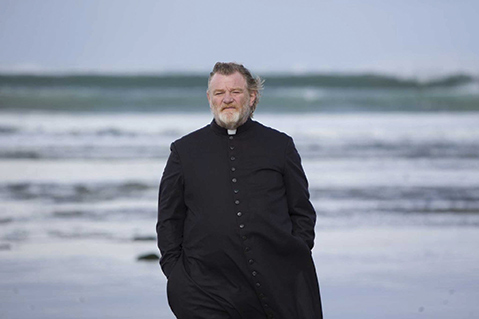Review: Calvary
Brendan Gleeson, Chris O’Dowd, and Kelly Reilly star in a film written and directed by John Michael McDonagh.

In the opening scene of Calvary, Brendan Gleeson plays a Catholic priest named Father James who takes confession from a troubled person we can’t see. The confessee claims that as a child he was repeatedly raped by a priest and promises to murder his confessor “Sunday next” not because James was the rapist but, more to the point, because he is innocent. The rest of the movie follows Father James’s week as he wanders among family, friends, and parishioners who naturally become a pageant of flawed and suspect humanity. It’s a situation that boils over with melodrama, but in the hands of director John Michael McDonagh, each tense interaction provides new perspectives on sin, insensitivity, and the almost forgotten virtue of forgiveness.
McDonagh directed The Guard, which was superficially shaped like a buddy cop thriller, but also bristled with meditations on death, morality, and the fine points of bigotry. Calvary is ostensibly a who-is-gonna-do-it mystery, but the themes become more compelling as each new quirky villager is introduced. Which one of these people might not be capable of killing a priest given the circumstances? Father James (the name traditionally assigned to Jesus’s brother) is a priest who was once married and has a beautiful daughter (Kelly Reilly) who has just tried to kill herself. The townie irregulars include a hapless cuckold played by the great Chris O’Dowd and a violently atheistic doctor (Aidan Gillen) whose soliloquy on God’s cruelty makes Beckett seem tame. We also meet a beautiful woman whose faith is unshaken even after losing her beloved husband in a senseless car wreck.
Strangely, McDonagh’s pet themes (including ironic thoughts about pets) meld with those of his playwright brother, Martin, who directed In Bruges, as if theatrical ideas got carried in their DNA. Together they’re the most entertaining moralists in film today. They both point out how shifting are the dark lines of self-scrutiny — confession is supposed to be good for the soul, but in Calvary it sets the stage for a lot of troubling questions about any redemption that’s based in self-sacrifice.



